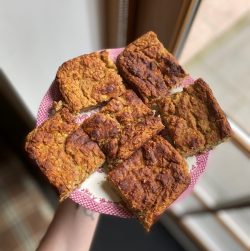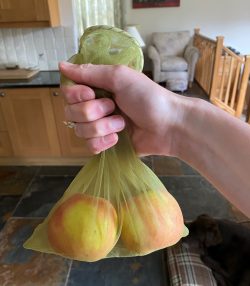
Home baking vegan food
Today marks the end of the international plastic-free July challenge. We talked to our Compass green team about how their month went, from triumphs to learnings for the future …
What did you anticipate would be the hardest part of the challenge?
Amy: avoiding plastic children’s products, particularly nappies!
Aslihan: avoiding plastic while grocery shopping.
Carl: avoiding single use plastics when they’re used to package foods in the supermarket.
Megan: toiletries, for example toothpaste! I had to experiment making my own.
Molly: buying food from shops – the supermarket is always the most frustrating place. Otherwise I am pretty good at being plastic conscious, and never use it without being aware of the potential damage.
What was the hardest part in reality?
Amy: plastic packaging in deliveries/post that I wasn’t expecting – this was hard to avoid.
Aslihan: avoiding plastic packages while grocery shopping.
Carl: the packaging of foods in the supermarket, plastic waste became even more obvious to me.
Megan: most vegan replacement products were tricky. The supermarkets around me only seem to stock plastic covered yoghurt tubs, plant milk lids, meat alternatives in plastic packaging, or hidden plastic in packets of things. Frozen and tinned items help a lot!
Molly: supermarkets and food remained a major challenge, alongside junk mail being posted through my door covered in plastic. Especially in the era of covid-19, it was very hard and frustrating to see a resurgence in single use plastic when we were trying to avoid it.
What was the easiest to change?
Amy: not buying vegetables or fruit in plastic, it meant shopping around a lot more, especially for things like salad leaves.
Aslihan: saying no to single-use coffee cups, bringing my own cup instead.
Carl: buying a BPA-free plastic water bottle to reuse instead of getting bottles from shops.
Megan: fruit, vegetables and home baking! I usually go for packaging-free veg anyway, and aim for products that are in-season and loose. It’s quite nice to have less to choose from sometimes! Home-made was also an easy way to avoid packaged snacks, and it’s tastier!
Molly: not buying drinks or using plastic bags, as I avoid using plastic at all costs anyway. It is easy to say no thank you to plastic cutlery etc.
What advice would you give to other people wanting to cut down their plastic?
Amy: make small changes over time, don’t try to achieve everything in one go – you may find it difficult to sustain.
Aslihan: take some time to go over where you use plastic the most, and what you can do to change it, before you start.
Carl: get a reusable water bottle.
Megan: do it bit by bit, and constantly progress! Try and see if you can find the same product/type of product without as much packaging, or something that could replace it. If this doesn’t work then buying in bulk can be useful. One large yoghurt tub involves less packaging than individually packaged portions.
Molly: avoid takeaways that use a lot of plastic, and the easy things to replace such as plastic bags and food sources that involve a lot of plastic. I recommend creating your own surface cleaners using essential oils. Also, avoid buying clothes using artificial fibres (ie not cotton/wool etc) as these leach plastic when washed. Growing your own salad also saves a lot of plastic (if you have the space!).
Do you think you’ll continue beyond July?
Amy: yes I will as much as I can – I hope shops will continue to make progress so that it’s easier for everyone to consume in a greener way.
Aslihan: I will definitely continue my efforts proactively.
Carl: 100%. I’ve learned good habits like having a reusable water bottle and reusable shopping bag.
Megan: absolutely. It only takes conscious effort for the first few weeks, and then it becomes a habit. Less packaging makes me feel good, is often cheaper, and means I don’t have to take the recycling bin out so often!
Molly: Yes! I will continue to avoid supporting products that involve a lot of plastic. I find it rewarding not having my bins so full after every meal.

Reusable bags for food

